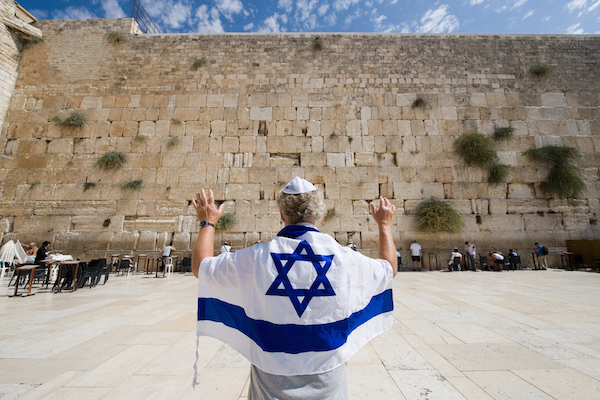The proposed ‘Nation-State Law’ and a wave of violence point to the urgency of questioning Israel’s place in Jewish identity. Shlomo Sand’s latest book, ‘How I Stopped Being a Jew,’ offers a starting point for such a discussion.

When I left Palestine this summer, I was relieved to leave the Israeli flag behind. No more blue and white snapping at everyone who passes military checkpoints. No more Star of David standing high over the army bases. Saying goodbye to the Israeli flag, or so I thought, would also mean an end to my ambivalence about it.
Upon seeing the flag, there was always a moment of recognition, familiarity. After all, it bears the Star of David and I grew up with this symbol in my home. I grew up with it dangling from my neck in the form of the Hebrew pendant — passed down from my great-grandmother — that my mother made me wear when I was a child.
But the same thing that would bring me a split second of comfort would enrage me. How dare Zionism appropriate my religion and my culture and my family and the Hebrew language? The language is not theirs alone. It also belonged to another one of my great-grandmothers, who lived in Eastern Europe and recorded all of the family’s deaths and births — not in Yiddish but in poetic Hebrew. (The sentences that noted a death, including those of her own children, begin, “I’m crying, I’m crying, the tears drip from my face”; births start with, “Luck, luck! Happiness and luck.”) She marked all these events on a piece of paper that she folded and carried to the New World with her, Hebrew pressed to her bosom as she crossed an ocean. The language belonged to her, it belonged to all of us.
How dare Zionism put the Star of David — which existed long before it and which will outlast its project — on their flag? How dare it, under the false pretense of ensuring the safety of my people, occupy another?
Not only has Zionism occupied Palestine, it has occupied Jewish identity.
Shlomo Sand’s latest book, How I Stopped Being a Jew, could be understood as a reaction to both of those occupations.
Sand, an Israeli professor at Tel Aviv University, is a historian and the author of The Invention of the Jewish People. In How I Stopped Being a Jew, which is not nearly as narrative or personal as the title suggests, Sand notes a number of moments that made him question his secular Jewish identity as well as the privilege that comes with that identity. Two particular experiences stand out.
The first: his daughter’s thoughtful and difficult questions about a Jewish holiday that celebrates, among other things, the death of non-Jews and Sand’s struggle to answer her.
The second: witnessing discrimination at Israel’s Ben-Gurion Airport. As Sand breezes through security, he sees a Palestinian citizen of Israel sidelined; as a non-Jew, she is automatically suspect.
In the pages that follow this recollection, Sand writes: “What is the meaning, then, of being ‘Jewish’ in the State of Israel? There is no doubt about it: being Jewish in Israel means, first and foremost, being a privileged citizen who enjoys prerogatives refused to those who are not Jews, and particularly those who are Arabs.”
This seems to be the heart of the book; it’s also an apt description of the conflict. But it doesn’t come until Chapter 10. Rather than using his personal experiences to tease out the inherent contradiction of the “Jewish and democratic” state — which seems the most powerful way to question the status quo — he spends most of the book engaged in an odd and counter-productive attempt to prove that there is no such thing as a secular Jewish identity.
I get his reasoning. Sand is hitting at the very foundation of the Zionist project. The early Zionists — who had arguably internalized anti-Semitic stereotypes prevalent in Europe at the time — wanted to shake off the yoke of the diaspora Jew. The diaspora Jew, or the image of him, was that of a frail figure, pale and weak, hunched over his books, flinching when intimidated; in Eretz Yisrael, the land of Israel, the new Jew would stand strong. He would be tanned, muscular and connected not to his religious books but, rather, the earth. And he would be secular.
The logic underpinning Sand’s argument is thus: Zionism and its secular Judaism gave rise to Israel; Israel gives Jews rights that it does not give to the native population, the Palestinians; secular Judaism itself must be interrogated.
I should be an easy sell for Sand’s argument. The easiest sell. I’m an anti-Zionist (or non-Zionist, whichever you prefer) who taught at a Palestinian university, left Israel to live in Bethlehem, and who has a Palestinian partner. And should we be blessed someday with children, we will do our best to raise them to be proud Palestinians.
Sand, however, doesn’t manage to convince even me that there is no such thing as secular Judaism. In part because, as he acknowledges, secular Jewish identity is amorphous and hard to define, thus making it equally hard to disprove. He runs through a list of things that might be considered secular Judaism, shooting them all down, one by one. However, the list is by no means exhaustive and, because identity today is often self-defined and intensely personal, Sand can’t possibly anticipate the many ways individuals construct their secular Jewish selves.
In some places, rather than making a solid argument, Sand resorts to assertions that go something like: you might think that lighting a few Hanukah candles makes you Jewish but it doesn’t count. Those who self-define as secular Jews won’t simply say, “Oh, okay, thanks for clearing that up for me, Shlomo. I hereby renounce my identity.” They’re more likely to say something like, “What gives you the right?” They will most likely react to Sand just as I react to the Israeli flag.
Unintentionally, Sand is playing into Zionism’s hands. Although he takes care to say that he is not conflating Judaism with Zionism, because his rejection of secular Judaism stems, in part, from his reaction to Zionism, he’s acknowledging and tacitly agreeing to Zionism’s claim on Jewish identity. Wouldn’t it be so much more powerful to stand as a Jew and reject Israel’s policies simply because they’re inhumane? Because they’re discriminatory? Because they’re undemocratic? Because they have no place in this day and age?
Sand’s reaction is, in a word, reactionary.
The book is at its most confusing — and most honest and most personal and most powerful — in the final two pages when Sand describes his attachment to Tel Aviv and the Hebrew language. “I inhabit a deep contradiction,” Sand admits. “My deep attachment to the place serves only to fuel the pessimism I feel towards it. And so I often plunge into a melancholy that is despondent about the present and fearful for the future.”
But I’d venture to say that many readers won’t make it to the end of his book because he spends the first 11 chapters alienating exactly the people who most need to be a part of this conversation: the self-defined secular Jews.
Some secular Jews, because they see Judaism as enlightened and humanistic, are increasingly concerned about Israel’s treatment of the Palestinians. Of course, Sand has already taken them to task, accurately pointing out that the Judaism itself is not actually enlightened and humanistic. But most Jews — secular or otherwise — don’t follow the religion to the letter anyways. This is the case with most practitioners of any tradition. How many Muslims follow the Quran to the letter? How many Christians live their lives according to a literal interpretation of the bible? Telling Jews that Judaism is not what they think it is and that, to take it a step further, they are not really Jews is unlikely to create the groundswell that will bring about meaningful change in Israel/Palestine. Rather, it’s more likely to persuade people to cling more tightly to their identities.
What needs to be interrogated is Israel’s claim on our identity and the ongoing attempts to conflate our identity with a piece of land that doesn’t actually belong to us. We, the Jews, had a wide range of identities long before the State of Israel existed. We did not need land to shore up our sense of selves.
But if we confuse our sense of selves with a piece of land — which is currently administered by a dangerous, racist regime — we risk losing our identities. Because we will, eventually, lose that land just as the Crusaders, Ottomans, and British did. Rather than rejecting secular Judaism and engaging in the counterproductive business of attempting to delegitimize others’ identity, secular Jewish identity should be detached from Israel, revitalized, and understood as something that has and can transcend time and place.
An alternate version of this article appeared in The National.

